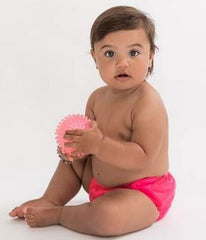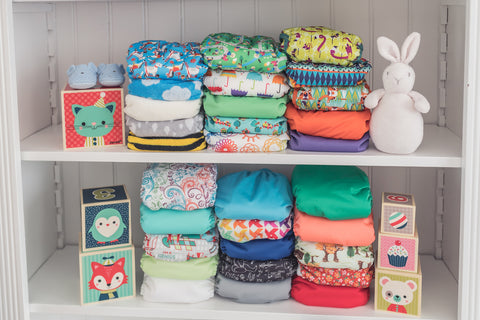WHY USE REUSABLE NAPPIES?
We're all looking for ways to reduce our use of single use plastics and, bearing in mind that the average baby goes through around 6-7 nappies per day, switching to real nappies can really help.
Modern cloth nappies are so much easier than you may think - colourful, soft, reliable fabrics and not a wet nappy bucket or nappy pin in sight.
Benefits of reusable nappies
- Soft, comfortable fabrics
Modern washable nappies can be made from a variety of different fabrics including the traditional terry cotton, organic cotton, super-soft bamboo, and soft, quick-drying man-made fabrics such as microfibre. They also come in a great range of colours and are designed to make a far more comfortable and natural alternative to single-use disposable nappies. Absorbent fabrics mean that there's no longer a need for super-absorbent chemicals next to baby's skin.
Reusable nappies can be fastened with either poppers, velcro or ’
Nappi Nippas’, making them nice and easy to put on. Gone are the days of the old nappy pin!


1970's (and yes, that is me!!) Modern cloth nappies
Real nappies provide a convenient and reliable alternative to single-use disposables. Parents are often surprised to find that real nappies are actually more successful at containing solids than disposable nappies.
Experience also shows that babies in reusable nappies tend to potty train months earlier than those in disposables.
If using real nappies full time, a newborn will need in the region of 20 nappies plus accessories such as nappy liners, waterproof bags, bucket etc.
A full kit, including everything you need, will cost in the region of £300. (Although opting for a cheaper brand will cut costs further!)
Cost comparisons:
-
Real Nappies £300-£450 approx depending on the brands used. This includes the nappies plus washing costs (electricity, water, washing powder) up to potty training.
-
Disposable nappies £700 -£800 per child (even more than this for 'eco-disposables').
Also remember that cloth nappies can often be used again on siblings, or can be sold on, leading to greater savings.
Too much to pay upfront? Financially, one of the problems with cloth nappies is that you need to buy everything upfront. Although they save you money long-term, they can be expensive to buy initially. It may be worth considering buying your nappies over time. Lizzie's Real Nappies offers free postage on orders of over £50, so why not spread the cost, buying, say, £50 worth every month until you have everything you need. Please let us know if you'd like to discuss this further.
- Less impact of the environment
People often argue that cloth nappies aren't very eco because they require a lot of washing, drying and detergents but, as a parent, you do get some control over how 'eco' you are.
Unlike disposables, real nappies put parents in control of the impact they have on the environment, with the carbon savings directly related to how you choose to wash your nappies.
For example: if you wash your nappies on a full wash at 40 degrees with a tablespoon of washing powder (that's all that's needed), then dry them on the line, an airing cupboard or airer, you'll have far less impact on the environment than if you wash a half wash at 90 degrees with a heap of washing powder, and then dry them in the tumble dryer.
Thus, used responsibly; real nappies can be 40% better for the environment than disposable nappies.
On top of this, disposable nappies are made from plastic and wood pulp. Both involve a lot of manufacturing. Around 7 million trees are cut down every year for this purpose, while it takes 1 cup of crude oil to make each and every disposable nappy.
3 billion disposable nappies that are thrown away each and every year in the UK, 90% of these are landfilled.
The average baby goes through between 5000 and 6000 disposable nappies. As they are expected to take around 500 years to decompose, they will have a large impact on the environment. If Henry VIII has worn disposables they'd still be in the ground, somewhere in London, now.
Even just using washable nappies part time will have a significant effect on the volume of waste you throw away each week - reducing the size of your bin and helping to relieve some of the pressure on our landfills.
5,000 - 6,000 single-use disposables buried in the ground
or
20 real nappies hanging on the line






